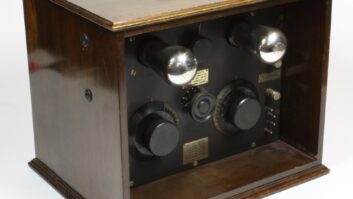
“There has been no systematic effort to collect American commercial radio programming at the national and local levels.”
So states the Library of Congress in a new report. It calls on its preservation board to set up a subcommittee “to develop strategies and tools to collect and preserve radio broadcast content.” And the report calls for a symposium to discuss the challenges of preserving American radio broadcasts.
This development will hearten anyone in radio who has ever worked at a station with a deep history, only to learn that a new owner or a new format was coming in and that all the station audio recordings had been tossed in a dumpster.
The recommendation about radio preservation is part of a much larger “blueprint” set out by the Library of Congress. Its overall goal: Saving sound. Congress has charged the library with implementing a national sound recording preservation program; this new report is a big step in that effort, and contains a list of 32 recommendations.
Librarian of Congress James Billington described the need: “Radio broadcasts, music, interviews, historic speeches, field recordings, comedy records, author readings and other recordings have already been forever lost to the American people. … [The plan] is America’s first significant step toward effective national collaboration to save our recorded-sound heritage for future generations.”
The report is long and raises many interesting angles dealing with audio technology, legislative reform and best practices for both analog and digital audio preservation. I imagine it will launch a new set of discussions and debate.
On the need to save commercial radio audio, the authors wrote: “Radio programs make up a significant portion of the nation’s recorded cultural history and encompass an array of genres, including news, music, drama, variety, soap operas, sports, quiz shows, public affairs, presidential addresses, community affairs, religious programming, propaganda, and educational shows.”
While some libraries and archives have collections of historical radio recordings, the report continued, “there have been few systematic efforts to collect contemporary commercial radio broadcast recordings, and to document and preserve the entire range of extant broadcasts in private and public collections.” It added that the Corporation for Public Broadcasting American Archive project seeks to preserve and manage public radio and TV materials; “however, there has been no systematic effort to collect American commercial radio programming at the national and local levels.”
Among broader recommendations, the plan calls for a national, publicly accessible directory of “institutional, corporate and private recorded-sound collections” as well as a national discography that details production of recordings and the location of preservation copies in public institutions.
It recommends creation of a national collections policy for sound recordings, “including a strategy to collect, catalog and preserve locally produced recordings, radio broadcast content and neglected and emerging audio formats and genres.”
It encourages the creation of university degree programs in audio archiving and preservation, as well as continuing education programs for audio engineers, archivists, curators and librarians.
Also on the list: More storage facilities for preservation; an Audio-Preservation Resource Directory website, including preservation guidelines; “best practices” for creating and preserving audio files that are “born digital”; and a basic licensing agreement to cover on-demand streaming by libraries and archives of recordings that are out of print.
The report notes that ownership is inadequately documented for many types of recordings, including radio broadcast recordings. It said the preservation board should encourage statewide and regional programs to collect and preserve “locally produced recorded sound, including radio broadcasts,” and that collections from radio stations should be part of those efforts.
There is much more here, of interest not only to radio people but audio and history enthusiasts in general. The plan also calls for copyright legislation reform that could be contentious. I’ll explore that and other details of this report in future posts. But for now: Yay Library of Congress for starting to tackle the question of how the U.S. can better preserve our radio heritage.










